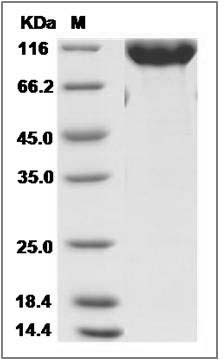-
Product Name
Rat CSF1R/MCSF Receptor/CD115 (Fc Tag) recombinant protein
- Documents
-
Description
M-CSFR encoded by the proto-oncogene c-fms is the receptor for colony stimulating factor 1 (CSF1R), a cytokine involved in the proliferation, differentiation, and activation of macrophages. This cell surface glycoprotein is consisted by an extracellular ligand-binding domain, a single membrane-spanning segment, and an intracellular tyrosine kinase domain. Binding of CSF1 activates the receptor kinase, leading to "autophosphorylation" of receptor subunits and the concomitant phosphorylation of a series of cellular proteins on tyrosine residues. CSF1R is a tyrosine kinase receptor that is absolutely required for macrophage differentiation and thus occupies a central role in hematopoiesis. CSF1 and its receptor (CSF1R, product of c-fms proto-oncogene) were initially implicated as essential for normal monocyte development as well as for trophoblastic implantation. This apparent role for CSF1/CSF1R in normal mammary gland development is very intriguing because this receptor/ligand pair has also been found to be important in the biology of breast cancer in which abnormal expression of CSF1 and its receptor correlates with tumor cell invasiveness and adverse clinical prognosis. Tumor cell expression of CSF1R is under the control of several steroid hormones (glucocorticoids and progestins) and the binding of several bHLH transcription factors, while tumor cell expression of CSF-1 appears to be regulated by other hormones, some of which are involved in normal lactogenic differentiation. However, studies have demonstrated that CSF1 and CSF1R have additional roles in mammary gland development during pregnancy and lactation. The role of CSF1 and CSF1R in normal and neoplastic mammary development that may elucidate potential relationships of growth factor-induced biological changes in the breast during pregnancy and tumor progression.
-
Protein name
Tyrosine-protein kinase receptor
-
Protein short names
CSFR; HDLS; MGC125014; CSF-1-R; FIM2; C-FMS; CD115; AI323359; CSF1R; M-CSFR; FMS; M-CSF-R; FIM-2; CSFMR; CSF-1R
-
Uniprot ID
D4ACA7
-
Gene Name
Csf1r; rCG_46850
-
Source/Expression Host
Human Cells
-
Expression Plasmid/cDNA
A DNA sequence encoding the rat CSF1R (D4ACA7) (Met1-Glu510) was expressed with the Fc region of human IgG1 at the C-terminus.
-
Protein Species
Rat
-
Molecular weight
The recombinant rat CSF1R/Fc is a disulfide-linked homodimer. The reduced monomer comprises 732 amino acids and has a predicted molecular mass of 82 kDa. The apparent molecular mass of the protein is approximately 106-116 kDa in SDS-PAGE under reducing conditions due to glycosylation.
-
Purity
> 95 % as determined by SDS-PAGE
-
Activity
1. Immobilized rat CSF1R-Fc at 10 μg/ml (100 μl/well) can bind biotinylated human CSF1-His (Cat:501502), The EC50 of biotinylated human CSF1-His (Cat:501502) is 1.7-3.9 ng/ml.
2. Measured by its ability to inhibit the mouse CSF-induced proliferation of M‑NFS‑60 mouse myelogenous leukemia lymphoblast cells. The ED50 for this effect is typically 0.015-0.06 μg/mL in the presence of 2.5 ng/ml Recombinant Mouse M-CSF. -
Validations

Rat CSF1R / MCSF Receptor / CD115 Protein (Fc Tag) SDS-PAGE
Related Products / Services
Please note: All products are "FOR RESEARCH USE ONLY AND ARE NOT INTENDED FOR DIAGNOSTIC OR THERAPEUTIC USE"
